When it comes to sharp, satirical commentary, few are as successful as John Oliver and his show, *Last Week Tonight*. Oliver’s ability to mix humor with critical insights about significant societal issues has garnered him a whole host of fans—and, coincidentally, a fair share of enemies as well. The recent legal troubles he finds himself in, stemming from accusations of defamation made by Dr. Brian Morley, illustrate the thin line between entertainment and liability that comedians must navigate in today’s media landscape. The lawsuit, which highlights the complexities of humor in reporting, raises vital questions not just about free speech, but about ethical storytelling in journalism.
The Allegations Unveiled
On March 28, 2024, Dr. Morley, a former medical director at AmeriHealth Caritas, unleashed a wave of legal action against Oliver and his production company, accusing them of fabricating statements that misrepresented his testimony during a Medicaid hearing. At the core of the complaint lies an episode from April 14, 2024, where Oliver allegedly distorted Morley’s comments to generate outrage among viewers. The lawsuit contends that by suggesting that Morley condoned neglectful treatment of a severely disabled young man, Oliver crossed a line, potentially damaging Morley’s reputation beyond repair.
The primary thrust of Morley’s argument rests on the assertion that the editing choices made by Oliver’s team were not just careless, but maliciously crafted to create a sensational narrative. In a world where ratings often dictate content, the episode reflected a growing trend: sensationalism overshadowing truth. When satire transitions into slander, it challenges the integrity of the very platform that critiques injustice.
The Fine Line Between Comedy and Defamation
At the heart of this case is the concept of context. While comedians are afforded some latitude under the First Amendment, Morley’s legal team contends that the manner in which Oliver presented his remarks was engineered to provoke outcry, rather than inform. They highlight that the out-of-context quotes presented an entirely different picture of Morley’s stance on healthcare, which, according to the complaint filed in New York, could indicate malicious intent rather than mere humor.
Oliver’s reaction in the show—“fuck that doctor with a rusty canoe”—underscores the emotive power of television satire. It captivates audiences but stirs potent consequences when the boundaries of truth are crossed. The implications of Morley’s allegations are profound; if satire is wielded irresponsibly, it undermines the credibility of medical professionals and public figures. This incident serves as a cautionary tale about how comedic commentary can potentially erode ethical standards in journalism.
The Role of Editing in Modern Media
The responsibility of content producers to maintain integrity goes beyond the immediate people involved. In ‘Last Week Tonight’, editing shapes the narrative. According to court documents, a senior producer on the show had reportedly reviewed the complete three-hour hearing before airing the episode. If Morley’s claims are valid, the producers knowingly prioritized sensationalism over factual representation. This editing strategy raises questions about the ethical obligations content creators hold toward the individuals they critique; straying into defamation territory can result in a significant backfire.
Morley’s legal team seems to draw a compelling argument about how the segment was ‘manipulated,’ focusing on the need for accuracy in the dissemination of information, especially concerning serious matters like healthcare.
Public Reaction and Media Responsibility
Public opinion surrounding this case has already sparked considerable debate. Many fans of Oliver’s work remain steadfast in their admiration, often dismissing Morley’s claims as an attempt to silence criticism. Conversely, advocates for responsible media practices underscore the risks of ill-considered satire, asserting that comedy should never come at the expense of truth.
This case serves as a challenging reminder for commentators: while the elements of irony and wit provide entertainment, they also bear significant weight in shaping public discourse. The manner in which comedians like Oliver address critical issues can influence societal views and perspectives on healthcare and other essential services, for which they must proceed with considerable caution.
A Shift in the Media Landscape
As we navigate through this legal sh*t show, it becomes increasingly evident that the ongoing evolution of media demands a reevaluation of standards. The age of social media has transformed how information is disseminated and consumed, leading to rampant misinformation and sensationalism.
The Oliver-Morley case thrusts a spotlight on this tumultuous dynamic, pushing audiences to reflect on the intersection of comedy, fact, and the legal ramifications of commentary. It highlights an urgent need for a conversation about the role of humor in tackling grave issues, and how accountability must be intertwined with the art of satire. As Oliver prepares to face the courtroom, the wider media environment may yet witness a recalibration of how we define the boundaries of humor in reporting.


Leave a Reply